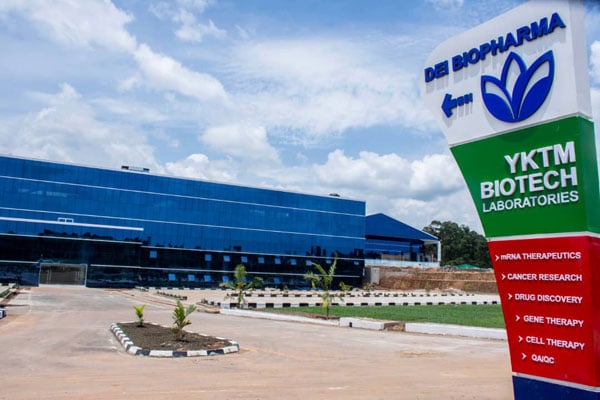Parliament approves Shs578b bailout to private vaccine factory

Members of Parliament during the plenary session chaired by Speaker Anita Among on April 23, 2024. PHOTO/DAVID LUBOWA
What you need to know:
- MPs opposed to the bailout said it was inappropriate for government to fund a "sick company."
Parliament on Tuesday approved a Shs1.1trillion supplementary budget including a contentious Shs578billion bailout to Dei Bio Pharma Ltd, a private drug and vaccine manufacturing plant owned by businessman Mathias Magoola.
Although the money to Dei Bio Pharma Ltd was okayed by Parliament’s budget committee, the House was divided on the matter following a minority report presented by Kiira Municipality legislator Ibrahim Ssemujju Nganda, who is also the shadow minister for finance.
In the minority report which was also signed by lawmakers Mathias Mpuuga (Nyendo-Mukungwe MP) and Yusuf Nsibambi (Mawokota South), the trio recommended that it is wrong for government to continue funding a private entity, without through accountability on the Shs145billion which government has injected into the company since its inauguration in 2021.
“Dei is troubled by a $100million it borrowed from Equity Bank. All the money government is extending is being used to clear the loan. That is why the government now wants to inject another She578.4 billion,” the minority report read in part.
“Someone who can make us remove money from debt servicing in order for us to pay his debts… it is not this Magoola, someone must be hiding under Magoola. Just like Lubowa Hospital, there is minimal participation of the health and other experts in this [Dei] venture,” it added.

Mathias Magoola. PHOTO/FILE
In a rejoinder, the Kampala Central Member of Parliament (MP) Muhammad Nsereko tasked the finance minister to justify Dei’s bail out by government.
State minister for finance Henry Musasizi noted that the company was doing well until recently when it got trapped into the current challenges.
“In May 2023, when Parliament considered the budget for this financial year, I didn’t know that Dei company was to fall into this problem and need to be rescued, therefore this transaction suitably falls into the unforeseeable and the unavoidable,” he explained.
He further disclosed that “government has an arrangement to buy shares into the company after doing a thorough evaluation.”
“…but for now this company is sick and we don’t want it to die,” the minister remarked.
His submission irked a section of legislators including Muwanga Kivumbi and Leader of Opposition Joel Ssenyonyi, who questioned government's chronology of execution.
“The minister is aware that while we were budgeting for this financial year, Dei was a sick company, because when he came to brief the budget committee he required Shs2trillion and now they are taking us process by process because we even then we allocated Shs70billion to Dei company,” Kivumbi noted.
Ssenyonyi reiterated that: “Why are we investing Shs578billion into a sick company? This should not even be a partisan issue, because voters are going to ask the value addition of this money and we will not be able to answer.”
But deputy attorney general Jackson Kafuuzi argued that the government has a Memorandum of Understanding (MoU) with Dei company, among which it was agreed that the government will buy equity without fail.
“If this company is finished, it is going to be one of the biggest pharmaceuticals in East and central Africa. We spend a lot of money on importing pharmaceuticals and most of them will be produced here once Dei Company is saved,” Kafuuzi observed.

Mr Mathias Magoola (right) speaks to the minister for Science and Innovation, Dr Monica Musenero (2nd right), and other officials at Dei Biopharma manufacturing facility in Matugga on March 22, 2023. PHOTOS/SYLIVIA KATUSHABE
Before adoption of the motion to extend Shs578billion to Dei Bio Pharma, Speaker Anita Among directed that before disbursement, there must be:
•An evaluation and the chairperson of parliament’s budget committee must ensure that it is done for and on behalf of Parliament and report back to the House.
•There should be an evaluation of the assets that are in existence at the company site.
•Upon evaluation and disbursement of the funds, the security documents of the company such as the land titles must be kept with treasury not with the owners.





